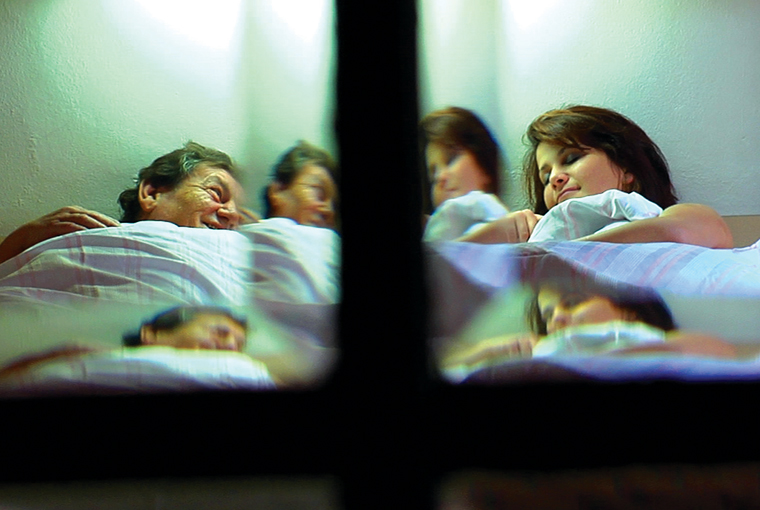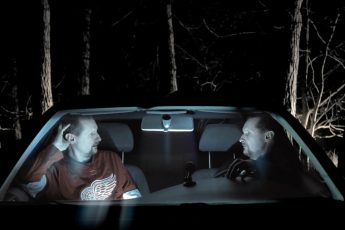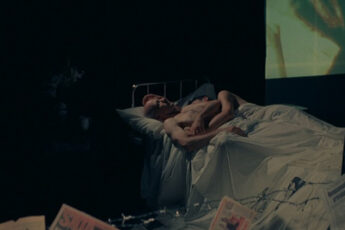Freedom, Reality
Iveta Grófová’s Made in Ash (Až do mesta Aš, 2012)
Vol. 30 (June 2013) by Konstanty Kuzma
Dorotka, a recent high school graduate from Slovakia, moves to the Czech Republic to find work. With a prearranged job and housing, her boyfriend assures her that things will work out. This also applies to their relationship: they agree to talk, and Dorotka finds a public square in her new town in Czech Republic streamed by a web-accessible camera. When time allows, they’ll speak over the telephone as Dorotka appears online. But neither can the noisy image surveil what Dorotka is up to, nor can it communicate what she’s going through. The square becomes an ineffective place of escape, the realisation of Dorotka’s urgent desire to be “seen”. Time passes and things turn ugly, but Dorotka’s mother won’t listen, her boyfriend stops caring, and her room-mate Silvia won’t do: Dorotka dreams of “a prince”, someone from the outside who will save her from her misery. In urgent need of money after losing her job due to insufficient efficiency in a well-surveilled textile factory, Dorotka starts work at a local shop but is kicked out again, this time because she doesn’t know Czech. Soon, Silvia introduces her to Johann, a 50+ stranger from Germany, “in [urgent] need of a woman”. He offers her a new existence further West – is this the prince Dorotka has been dreaming of? No, but the last hope of escape as Dorotka drifts into prostitution.
The low budget works well for Grófová. Originally intended as a documentary, Grófová fictionalised the story with the non-actors she wanted to portray. Dorotka’s low-life environment makes the film’s stylistic austerity seem authentic; this is a story told in the language of its characters. Ignorant of convoluted scene set-ups, the camera follows the characters indiscreetly. Observational patience is the film’s greatest merit: when we watch Johann and Dorotka hackling over their deal, or Dorotka having fun at a club, Grófová’s intimacy with her characters pays off. Though too reducable to this feature, Made in Ash succeeds in illustrating an opaque and odious world without drifting into judgemental detachment.
In Germany, a “much nicer place than Bohemia”, Johann promises Dorotka a house, a garden, a swimming pool, a dog and a car: the material pendants to Dorotka’s physical investment into the relationship. Grófová spends a great time observing the convincing Silvia and Johann have to do, in which Dorotka’s hesitations seem to be regarded as empty barriers originating in her juvenile innocence. Dorotka ends up in Germany, the Western-most point in her journey, and yet here we witness her at a lower point than when her journey started. Still, this work is not the classical “disillusionment” film. Dorotka has few, if any expectations traveling to the Czech Republic. She knows that she will be payed poorly and that life will be tough. It’s a simple fact of life that Czechs live better than Slovaks (and Germans live better yet) – the inescapability of these facts is the story’s true tragedy. Our protagonist grows up in a social and cultural context where traveling to another country with minimal financial backing, and agreeing to both prostitution and a set-up marriage become rational actions because no sane alternatives are readily available. Dorotka’s inner life, then, is reflexive, not causally relevant, always turned towards the past and present and hence never able to work towards a safer future.
Though it may originate in reality, this disappearance of the freedom of will is also what is most detrimental to the story: the lack of an agent and ethical measurability keep the audience at a safe distance from the characters. It is difficult to get involved into a story whose road has been paved beforehand, especially given that this is one that has been told before (Austrian helmer Ulrich Seidl’s Import Export is but one reference). In the end, one wonders whether this film would have worked better as a documentary, where reality trumps worries over predictability and originality. Grófová ends up with a pertinent message, but no narrative wit to back it up.




Leave a Comment